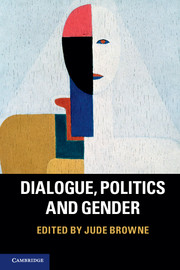Book contents
- Frontmatter
- Contents
- List of contributors
- Acknowledgements
- Introduction
- 1 Women and the standpoint of concrete others
- 2 Gender, discourse and non-essentialism
- 3 Universalism in feminist international ethics
- 4 Language, gender, dialogue, ethics
- 5 Between consensus and deconstruction
- 6 Trapped in a family portrait?
- 7 Gender, gesture and garments
- 8 What kind of dialogue do we need?
- 9 Deliberation, domination and decision-making
- Index
- References
4 - Language, gender, dialogue, ethics
Universalism and consensus after gender trouble
Published online by Cambridge University Press: 05 August 2013
- Frontmatter
- Contents
- List of contributors
- Acknowledgements
- Introduction
- 1 Women and the standpoint of concrete others
- 2 Gender, discourse and non-essentialism
- 3 Universalism in feminist international ethics
- 4 Language, gender, dialogue, ethics
- 5 Between consensus and deconstruction
- 6 Trapped in a family portrait?
- 7 Gender, gesture and garments
- 8 What kind of dialogue do we need?
- 9 Deliberation, domination and decision-making
- Index
- References
Summary
Conventionally ethics is a matter for human individuals who use language to talk about ‘things’ from their own perspectives. Ethical universals are thus linguistic artefacts or ‘things’ (of a certain kind) about which individuals may agree or disagree, and when the morally good life is the ‘thing’ under discussion, then ethics represents a vocabulary about these ‘things’ through which individuals may, or may not, achieve consensus, that is, assent to propositions in language about ‘things’ that feature in matters of life and death. On this understanding, then, human individuals have properties, such as gender, which will influence, or even determine, what they think, and therefore say, about ‘things’, most particularly the important ‘things’ that feature in ethics and therefore in any talk or dialogue of this kind. It follows, of course, that human individuals with different properties, such as gender, will be likely to express themselves differently, perhaps even use different language, and certainly understand even common terms differently. Much the same argument can be made about any property that human individuals are said to have, or even about human individual experience as a unique and cumulative phenomenon. Or, as Gadamer said, ‘We understand in a different way, if we understand at all’.
On this general understanding of the human subject, and of that subject’s use of language to talk about ‘things’, it is unsurprising that feminism starts from a point of difference about the human subject. This difference encompasses physical properties of the body, psychological properties of the mind, and intersubjective experiences that may or may not be shared, or even shareable, to varying extents, through dialogue. Much feminist work has been devoted to discovering, recovering and specifying experiences, notably those of oppression and violence, of women, that is, those human subjects who share that property of being female, and therefore being a woman.
- Type
- Chapter
- Information
- Dialogue, Politics and Gender , pp. 107 - 119Publisher: Cambridge University PressPrint publication year: 2013



